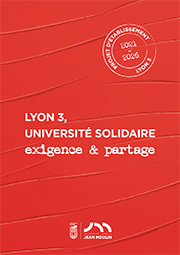AccueilRechercheProgrammes et productions scientifiquesThèsesThèses soutenuesThèses soutenues - 2006-2021Thèses soutenues - 2019
-
Partager cette page
- Recherche,
SABATIER Aurélien
La disparition de Hiraoka Kimitake et la naissance de l’écrivain Mishima Yukio : de lyrisme à l’ironie
Publié le 26 juin 2019 – Mis à jour le 21 janvier 2020
Thèse en Etudes de l'Asie et ses Diasporas, soutenue le 20 juin 2019.
Dans cette étude, nous nous intéressons à l’œuvre de jeunesse de Hiraoka Kimitake et à la naissance de Mishima Yukio. Après une partie préliminaire dans laquelle nous étudions l’œuvre du poète Hiraoka Kimitake entre 1937 et 1941, nous analysons l’œuvre du romancier, nouvelliste, épistolier et dramaturge Mishima Yukio entre La Forêt en fleurs (1941) et Kantan (1950). Nous nous demandons en quoi cette période est la période de gestation d’une entité à laquelle renvoie le signe Mishima Yukio et qui proclame scandaleusement son désir de vivre ? Autrement dit, en quoi le jeune homme Hiraoka Kimitake, en devenant Mishima Yukio, l’auteur de l’œuvre, se fait-il « autre qu’il n’était auparavant » (Starobinski) à travers l’expérience de la Modernité et plus particulièrement à travers l’intériorisation et la mise en œuvre du concept d’ironie que lui fournit l’École Romantique Japonaise ? Nous montrons que Hiraoka Kimitake devient Mishima Yukio à travers la redécouverte de la notion d’ironie dont l’École Romantique Japonaise a véhiculé une conception pervertie, lyrique, passéiste et pessimiste. Après avoir fait sien le concept d’ironie développé par l’École Romantique Japonaise, l’écrivain le renouvelle en revenant à l’origine du concept, c’est-à-dire en réactivant l’ironie socratique, fondamentalement optimiste et futuriste, mais supposant une certaine violence. Cette ironie joyeuse et brutale, ce « gai savoir », qui s’appuie sur une conception cyclique du temps, sur un certain « éternel retour », est le fondement existentiel de la littérature de Hiraoka Kimitake dont le pseudonyme Mishima Yukio traduit la disparition.
We study the early Hiraoka Kimitake and the nascency of Mishima Yukio. After we study the work of poet Hiraoka Kimitake between 1937 and 1941, we analyze the work of the novelist, short novelist, letter-writer and playwright Mishima Yukio during the period 1941-1950. We are particulary interested in the period that separates “The Forest in Bloom (1941)” and “Kantan (1950).” We wonder how the period between the short novel The Forest in Bloom and the Kantan drama is the gestation period of an entity to which the sign Mishima refers and which scandalously proclaims its desire to live. In other words, how does the young man Hiraoka Kimitake, becoming Mishima Yukio, the author of the work, become "other than he was before" (Starobinski) through the experience of the Modernity and especially through the maturation and internalization of the concept of irony provided by the Japanese Romantic School? We show that Hiraoka Kimitake becomes Mishima Yukio through the rediscovery of the notion of irony of which the Japanese Romantic School has conveyed a perverted, lyrical, backward and pessimistic conception. After having adopted the concept of irony developed by the Japanese Romantic School, the writer renews it by returning to the origin of the concept, that is to say by renewing the concept of Socratic Irony, fundamentally optimistic, and futuristic, but underlying some violence. This joyous and brutal irony; this "gay knowledge", which is based on a cyclical conception of time, on a certain "eternal return", is the existential foundation of the literature of Hiraoka Kimitake whose pseudonym Mishima Yukio represents the disappearance.
Mots-clés : Mishima Yukio, Hiraoka Kimitake, lyrisme, ironie, littérature, Japon, poésie, théâtre, modernité, nô, Romantisme
Keywords : Mishima Yukio, Hiraoka Kimitake, lyricism, irony, literature, Japan, poetry, theater, modernity, noh, Romanticism
Directeur(trice) de thèse : Claire DODANE
Membres du jury :
- Madame Claire DODANE, Professeure des universités, Université Jean Moulin Lyon 3,
- Mme Anne BAYARD-SAKAI, Professeure des universités, Institut national des langues et civilisations orientales Paris,
- M. Emmanuel LOZERAND, Professeur des universités, Institut national des langues et civilisations orientale Paris,
- M. Thomas GARCIN, Maitre de conférences, Université Paris Diderot,
- M. Marx WILLIAM, Professeur des universités, Université Paris Nanterre.
Président(e) du jury : Anne BAYARD-SAKAI
We study the early Hiraoka Kimitake and the nascency of Mishima Yukio. After we study the work of poet Hiraoka Kimitake between 1937 and 1941, we analyze the work of the novelist, short novelist, letter-writer and playwright Mishima Yukio during the period 1941-1950. We are particulary interested in the period that separates “The Forest in Bloom (1941)” and “Kantan (1950).” We wonder how the period between the short novel The Forest in Bloom and the Kantan drama is the gestation period of an entity to which the sign Mishima refers and which scandalously proclaims its desire to live. In other words, how does the young man Hiraoka Kimitake, becoming Mishima Yukio, the author of the work, become "other than he was before" (Starobinski) through the experience of the Modernity and especially through the maturation and internalization of the concept of irony provided by the Japanese Romantic School? We show that Hiraoka Kimitake becomes Mishima Yukio through the rediscovery of the notion of irony of which the Japanese Romantic School has conveyed a perverted, lyrical, backward and pessimistic conception. After having adopted the concept of irony developed by the Japanese Romantic School, the writer renews it by returning to the origin of the concept, that is to say by renewing the concept of Socratic Irony, fundamentally optimistic, and futuristic, but underlying some violence. This joyous and brutal irony; this "gay knowledge", which is based on a cyclical conception of time, on a certain "eternal return", is the existential foundation of the literature of Hiraoka Kimitake whose pseudonym Mishima Yukio represents the disappearance.
Mots-clés : Mishima Yukio, Hiraoka Kimitake, lyrisme, ironie, littérature, Japon, poésie, théâtre, modernité, nô, Romantisme
Keywords : Mishima Yukio, Hiraoka Kimitake, lyricism, irony, literature, Japan, poetry, theater, modernity, noh, Romanticism
Directeur(trice) de thèse : Claire DODANE
Membres du jury :
- Madame Claire DODANE, Professeure des universités, Université Jean Moulin Lyon 3,
- Mme Anne BAYARD-SAKAI, Professeure des universités, Institut national des langues et civilisations orientales Paris,
- M. Emmanuel LOZERAND, Professeur des universités, Institut national des langues et civilisations orientale Paris,
- M. Thomas GARCIN, Maitre de conférences, Université Paris Diderot,
- M. Marx WILLIAM, Professeur des universités, Université Paris Nanterre.
Président(e) du jury : Anne BAYARD-SAKAI
Documentation
Mise à jour : 21 janvier 2020







